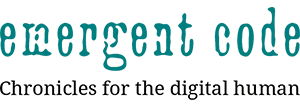
12.0 A new operating system
 Algorithms look for patterns. And yet, if the human spirit is to meander and fully flourish in the digital era, it must resist them.
Algorithms look for patterns. And yet, if the human spirit is to meander and fully flourish in the digital era, it must resist them.
Conformity and resilience operate in complex tension in the digital era.
This final section of the Emergent Code Chronicles looks at how we might go beyond a culture of unquestioning beliefs and certainties into an environment that is highly challenging.
Our new operating system involves figuring out how we solve this challenge and co-exist with code consciously. It’s an OS in which we can grow as digital humans and use the deep space of the web to sit with seemingly difficult, sometimes unanswerable, challenges and solve them.
As DNA and the very seeds of life are coming under the control of code, how does code itself propagate and gestate as a force in our lives? This is a question that, as digital humans, we have the right to ask and answer.
Our new OS is a framework that defines a reasonable state of coded existence – how we live, how we work, how we learn, laugh and love as digital humans and technology driven networks.
How might we use digital technology and the internet of things to support the idea of the minimum viable human and quality of life? How can we use code to solve big problems, like the sustainability of the earth and the protecting and nurturing of our natural resources, and how can we make this transition elegantly, without unnecessary pain and chaos?
 Operating systems such as OSX, Android, Linux, Windows, all co-exist simultaneously, with numerous languages and scripts within them and API technology has made interoperability an essential digital function.
Operating systems such as OSX, Android, Linux, Windows, all co-exist simultaneously, with numerous languages and scripts within them and API technology has made interoperability an essential digital function.
Ironically, that digital interoperability and the ‘internet of things’ is happening at the very same time the differences between humans in many parts of the world have barely created more tension than they do now, driven on by scarcity, insecurity, loss and paranoia.
The digital world is one where individuality and atomisation exist side by side, an operating environment of unique elements and urls. Abundance is part of the digital model and there is more information than we could possibly want – more video, more functionality, more platforms, more calls on our time – but no singular truth, no simple certainties and this creates stresses on our human capacity for understanding.
Code makes everything relational. It can be a unifying force for good and a dynamic environment for innovation. Code is also paradoxical; both an indispensable means of navigating where we go to next and a force through which how we feel may ultimately become irrelevant; our humanity may be set aside or made subservient to the nervous systems of machines.
With code at our fingertips, people and actions are being formed and reformed at the same time. There is the opportunity to rewrite our outcomes and rethink the way we do things. As we lay down the digitally connected threads of the web we can code intentionally and this is an unprecedented gift.
It’s hard to know how to react in the face of code if we view it through the prism of an old outmoded OS. The age of the machines, during the last 250 years, has substantially improved our ability to meet fundamental human needs, but it has also ravaged global resources. Automation has come full circle as a herald of wealth and human redundancy. Old fashioned notions of employment and financial security are on the wane; wealth inequality is an increasingly a global macro-economic problem.
The industrial-age assumptions, business models and ways of working are up for review. The last ten years have shown how easy it can be for start-up after start-up to replace behemoth businesses.
As Yancey Strickler attests, organisations like Kickstarter have shown that there is space for everybody, independently and supportively, to make their way in the networked marketplace. This is the time to learn from our differences as humans, to delve deep into the soul of the human spirit in the face of robots.
With enquiring minds we can embark on unparalleled and sometimes discomforting discovery. This chapter explores that digital opportunity; it looks at the enormous asset of data and paths forward, new commits, that we can make and write into existence using good code.


One thought on “12.0 A new operating system”